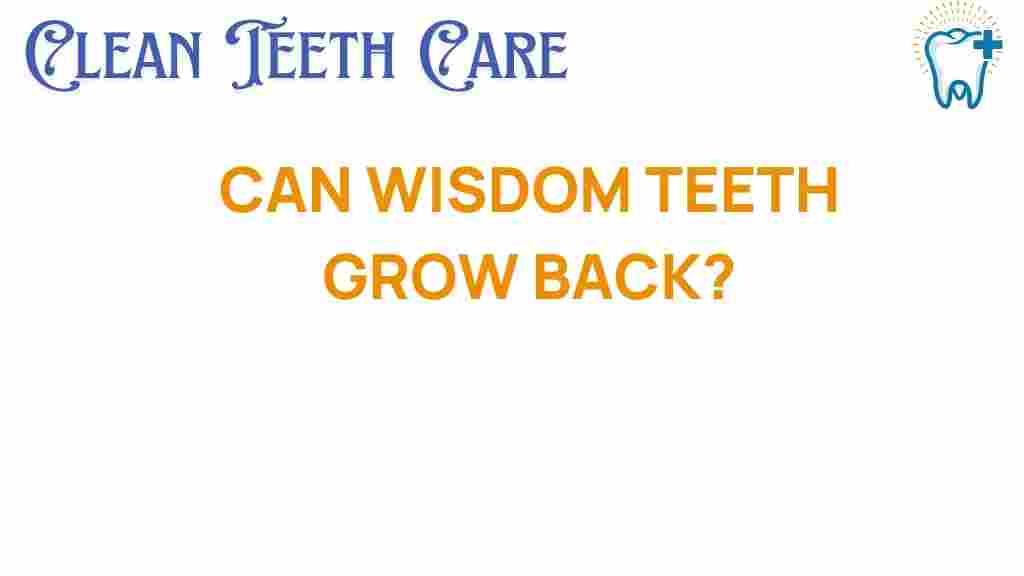The Surprising Truth: Can Wisdom Teeth Grow Back?
Wisdom teeth, often regarded as the last set of molars that emerge in late adolescence or early adulthood, have been the topic of much discussion and debate in the realm of dental health. Many people undergo oral surgery to extract these teeth, especially when they become impacted or cause alignment issues. But a common question arises: can wisdom teeth grow back after extraction? In this article, we will explore this question in depth, debunk myths, and provide essential insights into dental care and the truth about tooth regeneration.
Understanding Wisdom Teeth
Wisdom teeth typically emerge between the ages of 17 and 25. They are called “wisdom teeth” because they appear at a more mature age compared to other teeth. Here are some important points to consider:
- Location: Wisdom teeth are located at the back of the mouth, one in each quadrant.
- Function: They were once useful for our ancestors who had a rougher diet, but today they often serve no significant purpose.
- Common Issues: Many people experience pain, infection, or crowding due to these teeth, leading to the recommendation for extraction.
The Myth of Tooth Regeneration
One of the prevalent myths surrounding wisdom teeth is the idea that they can regenerate after being extracted. This myth may stem from the body’s natural ability to heal and regenerate tissue, but when it comes to teeth, the reality is quite different.
Once a tooth, including a wisdom tooth, is extracted, it does not grow back. The body does have mechanisms for healing, but these do not extend to the regeneration of teeth. Here’s a breakdown of how tooth loss impacts your dental health:
- Jawbone Health: The jawbone can begin to deteriorate after a tooth is removed, as the bone relies on stimulation from the tooth roots.
- Shifting Teeth: Adjacent teeth may shift into the space left by an extracted wisdom tooth, potentially causing alignment issues.
- Need for Orthodontics: If wisdom teeth are not removed in a timely manner, it may lead to the need for orthodontics in the future.
What Happens During Wisdom Tooth Extraction?
Understanding the process of wisdom tooth extraction can alleviate fears and misconceptions. Here’s a step-by-step outline of what to expect:
1. Consultation and Diagnosis
The first step is visiting a dentist or oral surgeon for a consultation. They will:
- Take X-rays to assess the position of the wisdom teeth.
- Determine if extraction is necessary based on the condition of the teeth and jawbone.
2. Preparing for Surgery
Once extraction is deemed necessary, the dentist will provide instructions, which may include:
- Avoiding certain medications or foods.
- Arranging for someone to drive you home after the procedure.
3. The Extraction Procedure
During the actual extraction, the surgeon will:
- Administer anesthesia to ensure you are comfortable.
- Make an incision in the gum tissue to access the tooth.
- Remove the tooth, which may involve breaking it into smaller pieces.
- Stitch the incision if necessary.
4. Recovery
Post-surgery, patients should expect some swelling and discomfort. Recovery tips include:
- Following the dentist’s instructions on pain management.
- Eating soft foods and maintaining proper dental care to prevent infection.
- Keeping follow-up appointments to monitor healing.
Myths About Wisdom Teeth and Extraction
Certain myths persist about wisdom teeth that can lead to misunderstandings. Let’s address some of the most common misconceptions:
Myth 1: Wisdom Teeth Are Unnecessary
While it’s true that modern diets do not require wisdom teeth, they served a purpose in our ancestors’ diets. However, for many today, they can cause more problems than they solve.
Myth 2: Extraction Is Always Painful
With advancements in anesthesia and surgical techniques, most patients report minimal discomfort during and after the procedure.
Myth 3: Wisdom Teeth Will Eventually Fall Out
Unlike baby teeth that naturally fall out, wisdom teeth do not have a mechanism for natural loss. If they are problematic, extraction is usually necessary.
Signs You May Need Wisdom Teeth Extraction
Understanding when extraction is necessary can help preserve your overall dental health. Some signs to look for include:
- Pain or discomfort in the back of the mouth.
- Swelling or infection around the gum line.
- Difficulty opening your mouth or chewing.
- Visible crowding of your other teeth.
What to Do if You Experience Problems
If you notice any of these symptoms, it’s crucial to consult a dental professional. They can provide a thorough examination and determine the best course of action. Here are some troubleshooting tips:
- Keep a Record: Note any symptoms, including pain levels and swelling.
- Contact Your Dentist: Don’t hesitate to reach out for advice or to schedule an appointment.
- Follow Care Instructions: If you’ve already had the extraction, ensure you’re following your dentist’s aftercare instructions closely.
Maintaining Dental Health After Wisdom Tooth Extraction
After your wisdom teeth have been extracted, maintaining dental health is vital to prevent complications. Here are some tips:
- Follow Up: Attend all follow-up appointments to ensure proper healing.
- Oral Hygiene: Continue brushing and flossing, but be gentle around the extraction site.
- Dietary Choices: Stick to soft foods for a few days post-surgery.
Conclusion
In conclusion, the notion that wisdom teeth can grow back after extraction is a myth. Once removed, these teeth do not regenerate, which underscores the importance of proper dental care and timely intervention when issues arise. If you experience discomfort or are considering extraction, consult a dental professional to explore your options. Remember, maintaining good dental health is crucial for your overall well-being.
For more information on maintaining your dental health, visit Dental Health Resources.
To learn more about the myths surrounding wisdom teeth and their extraction, check out this guide on Common Dental Myths.
This article is in the category Conditions and created by CleanTeethCare Team
